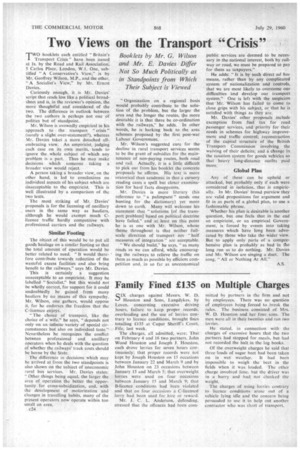Two Views on the Transport "Crisis"
Page 60

If you've noticed an error in this article please click here to report it so we can fix it.
TWO booklets each entitled " Britain's Transport Crisis" have been issued at Is. by the Road and Rail Association, 5 Carlos Place, London, W.1. One, sub
titled A Conservative's View," is by Mr. Geoffrey Wilson, M.P., and the other. "A Socialist's View," by Mr. Ernest Da vies.
Curiously enough, it is Mr. Davies' script that reads less like a political broadsheet and is, in the reviewer's opinion, the more thoughtful and considered of the two. The difference in outlook between the two authors is perhaps not one of politics but of standpoint.
Mr. Wilson is avowedly empirical in his approach to the transport " crisis " (surely a slight over-statement?), whereas Mr. Davies takeS a more detached allembracing view. An empiricist, judging each case on its own merits, tends to ignore the whole subject of which any probtem is a part. Thus he may make decisions which someone taking a broader view would reject.
A person taking a broader view, on the other hand, is led to conclusions on individual aspects of his subject which arc Unacceptable to the empiricist. This is well illustrated by a comparison of the two texts.
The most striking of Mr. Davies' proposals is for the licensing of ancillary users in the same way as hauliers, although he would exempt much Clicence traffic hardly competitive with professional carriers and the railways.
Similar Footing The object of this would be to put all goods haulage on a similar footing so that the total amount of operation would he better related to need. "It would therefore contribute towards reduction of the wasteful excess facilities and also bring benefit to the railways," says Mr. Davies.
This is certainly a suggestion unacceptable to an empiricist. It may be labelled "Socialist," but this would not be wholly correct, for support for it could undoubtedly be gained from many hauliers by no means of this sympathy, Mr. Wilson, one gathers, would oppose it, for he endorses the freedom that the C-licensee enjoys.
" The choice of transport, like the choice of a wife," he says, "depends not only on an infinite variety of special circumstances but also on individual taste." Nevertheless he recognizes the conflict between professional • and ancillary operators when he deals with the question of whether the railways' track costs should be home by the State.
The difference in decisions which may be arrived at from the two standpoints is also shown on the subject of uneconomic rural bus services. Mr. Davies states: "Other things being equal, the larger the area of operation the better the opportunity for cross-subsidization, and, with The development of motorization and changes in travelling habits, many of the preSent operators now operate within too small an area.
c24 "Organization on a regional basis would probably contribute to the solution of the problem, but the larger the area and the longer the routes, the more desirable it is that there be co-ordination with the railways," he adds. In other Words, he is harking back to the, area schemes. proposed by the first post-war Labour Government.
Mr. Wilson's suggested cure for the decline in rural transport services seems to be the grant of subsidies for the maintenance of non-paying routes, both road and rail. Actually, it is a little difficult to pick out from his booklet the concrete proposals he affirms. His text is more oratorical than academic in that a cursory reading casts a spell but closer examination for hard facts disappoints.
Mr. Davies is more literary (his reference to, "a palimpsest" sends one hunting for the dictionary) yet more down to earth. Many will welcome his statement that " solutions [of the transport problem] based on political doctrine have failed," and at least on this point he is at one with Mr. Wilson, whose theme throughout is that neither fullscale direction of transport nor "half measures of integration" arc acceptable.
"We should build," he says, "as many roads as we can afford, while encouraging the railways to relieve the traffic on them as much as possible by efficient competition and, in so far, as uneconomical public services are deemed to be necessary in the national interest, both by railway or road, we must be prepared to pay for them as taxpayers."
He, adds: "It is by such direct ad hoc means, rather than by any complicated system of nationalization and controls, that we are most likely to overcome our difficulties hod develop our transport system." One is left with the suspicion that Mr. Wilson has failed to come to close grips with his subject, or that he is satisfied with things as they are.
Mr. Davies' other proposals include exemption from fuel tax for road passenger services, and priority for their needs in schemes for highway improvement and traffic control; reconstruction of the capital structure of the British Transport Commission involving the
• lativing of their deficits; and a change in. the taxation system for goods vehicles so that heavy long-distance outfits paid more.
Global Plan
Any of these can be upheld or attacked, but probably only if each were considered in isolation, that is empirically. In Mr. Davies' broad purview they are valid propositions for argument and fit in as parts of a global plan, to use a fashionable phrase.
Whether his plan is desirable is another question, but one feels that in the end an empiricist, or an empirical Government, is forced by events into taking measures which have long been advocated by those who take the wider view. But to apply only parts of a comprehensive plan is probably as bad in the long run as to do nothing. Mr. Davies and Mr. Wilson are singing a duet. The song, "All or Nothing At All."
A.S.








































































































